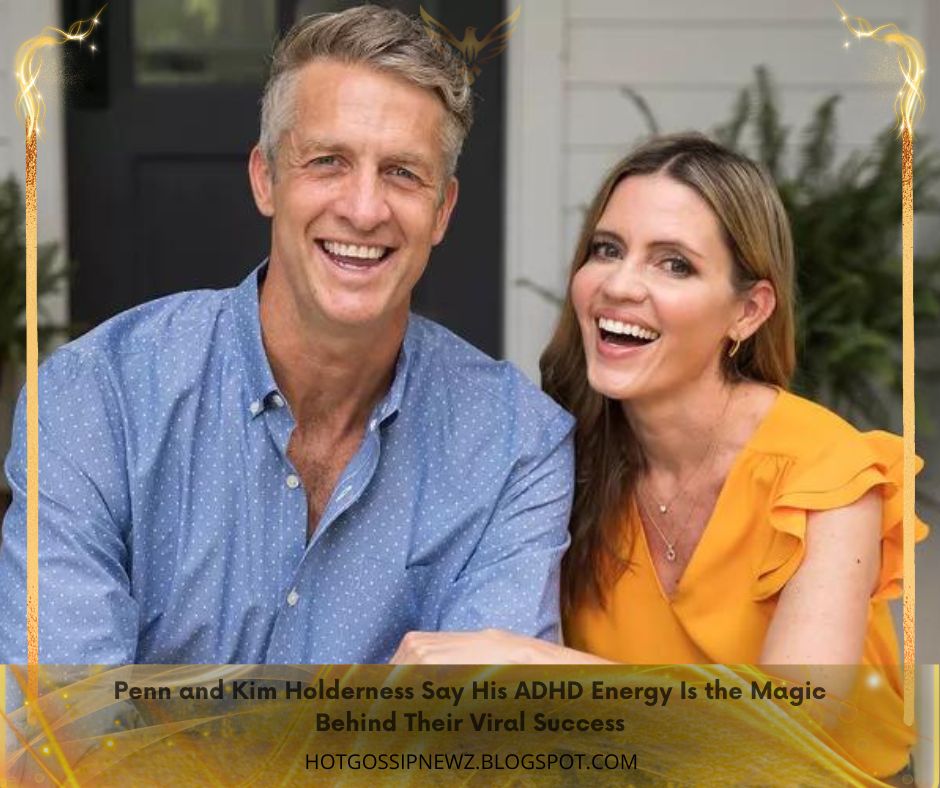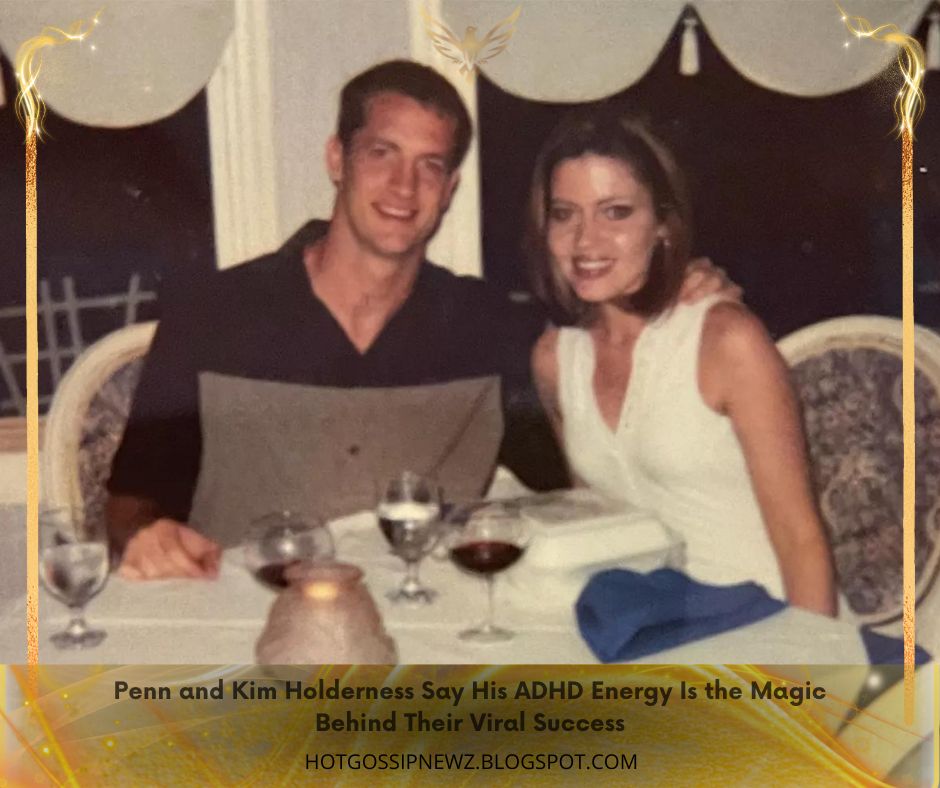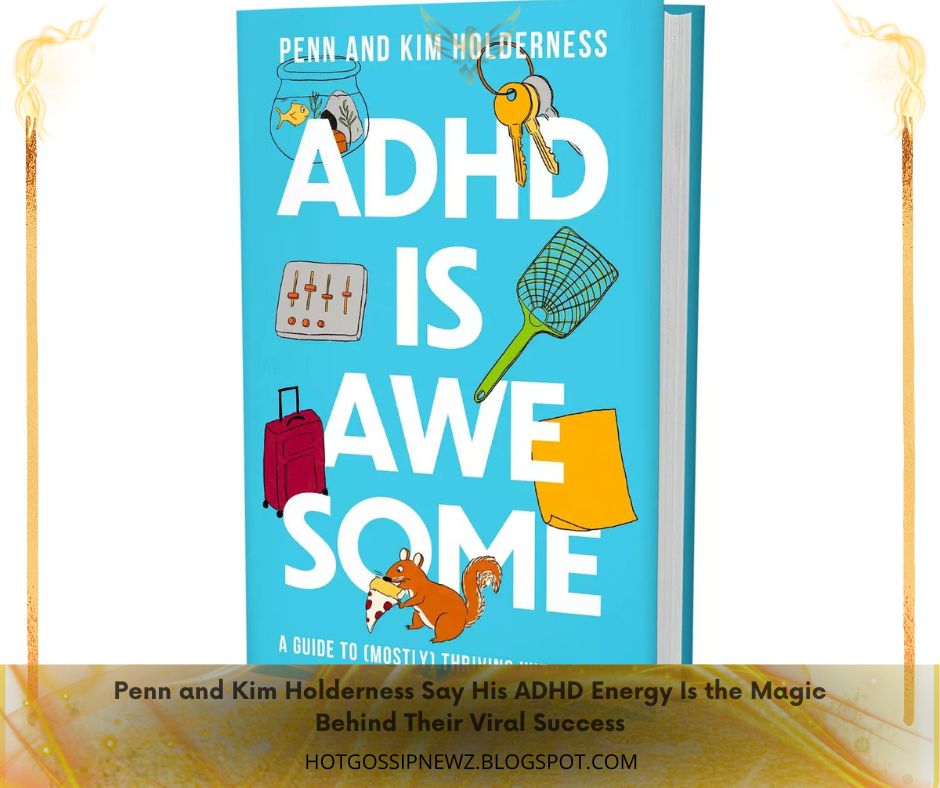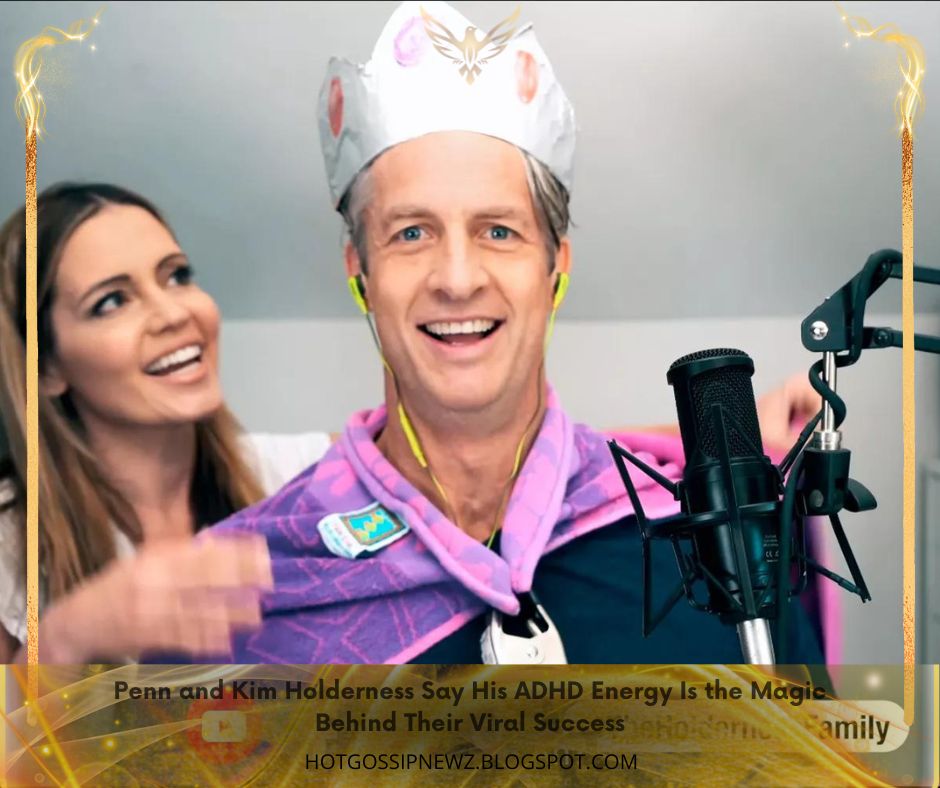Kim Holderness knew from the very beginning that there was something different — and special — about her future husband Penn.
When they first met in 2003, the couple behind The Holderness Family viral videos were both newscasters in Florida. Kim remembers spotting Penn across a bar.
“He was doing the worm on the stage,” Kim tells. “I was like, ‘I’m going to marry that man.’ ”
The silliness and impulsivity won her heart. In fact, “all the things I was attracted to about him were because of his ADHD,” she says of Penn, who was diagnosed with the neuro-developmental condition Attention Deficit Hyperactivity Disorder when he was in college.
For the past 10 years, ever since their song "Xmas Jammies" became a viral hit, Penn, 49, and Kim, 48, have harnessed his ADHD zeal in their work as Raleigh, N.C.,-based content creators. Their 8 million-plus fans follow videos and Penn-written parodies about everything from parenting and Gen X to Taylor Swift and pickleball.
Along the way Penn’s symptoms put stress on their relationship, but in their new book, ADHD is Awesome, out April 30, the couple, married nearly 19 years, lean into the complex mix of challenges and gifts that come with ADHD, which affects at least 8.7 million American adults.
“‘Awesome’ means not only inspiring, but also terrifying. It’s a lot of good and bad,” says Penn, who, like an increasing number of adults, wasn’t diagnosed until he was older. A recent JAMA study found that the rate of adults diagnosed with Attention Deficit Hyperactivity Disorder more than doubled since 2007. “I have my career, my family and my life in part because of ADHD,” he says.
A “fidgety kid” growing up in Durham, N.C., Penn would chew on his shirt collar, crinkle up napkins and tear them to pieces, daydream in class and “have conversations with myself while people were talking about other things,” he says. “The older I got, the more difficult it was for people to be friends with me. I felt a lot of shame.” His mom, a teacher, recognized he was struggling and helped him organize, but “it was the ’80s, and there was no literature on ADHD.”
Finally, after his junior year of college, with his grades suffering, he got an evaluation. The verdict: “A fairly scorching case of ADHD,” he says. “Anybody can tell that after spending five minutes with me.” The diagnosis was a relief, “but I hated the name,” he says. “It’s inaccurate. It’s not a deficit. We have an abundance of attention. We just have trouble focusing that attention.”
He graduated and found a job as a sports reporter, a perfect fit for his need for quick deadlines and excitement, and met Kim. Life felt manageable.
At first Kim found his ADHD quirks cute: the boundless energy (“I call him my human golden retriever”), the spontaneous songs, his scatterbrained tendencies. “When you’re dating, it’s charming,” says Kim.
But after the couple married in 2005, had Lola, now 17, and Penn Charles, now 14, and quit their jobs to start a video production company, “my executive functioning was taxed,” Penn says. “Things started falling through the cracks.”
One time he nearly started a grease fire because he forgot to turn off the stove. He lost multiple wedding rings. His inattention left his family feeling like he didn’t care. “In conversations, I just wasn’t there,” he says, “You let people down.”
Adds Kim: “People would joke, ‘It’s like you have three kids.’ But I did not laugh. It took me a long time to figure out he wasn’t doing this on purpose.”
After marriage counseling eight years ago, Penn began researching ADHD and developed strategies for managing his condition: a magnet on his car hood reminds him not to leave his coffee cup there; pockets with zippers ensure his valuables don’t fall out unnoticed; a wooden bowl in the kitchen is the repository for his frequently lost phone and keys; lots and lots of lists.
He does, however, still have slip-ups. Last year, after working on a video, he dashed out to pick up the wrong kid. “It exited my brain which person I was supposed to pick up,” he says. “Kim was in a panic. I felt ashamed.” But the family has learned to roll with his missteps. “He's never like, ‘I can’t help it. It’s my ADHD.’ He does not pull that card,” says Kim. “The kids realize this is the package. You don’t get exceptional fun at dinnertime without him forgetting about you at school occasionally.”
And the creativity and ability to hyper-focus that comes with Penn's ADHD — which he's called his "superpower"— has been the fuel behind some of the couple's biggest video hits. In 2020, he wrote a COVID-themed parody of 'Hamilton' ("I am not throwing away this mask!") in 20 minutes - the video has had 27 million views on Facebook alone. The intense concentration that comes with his ADHD even helped the couple cross the finish line to win The Amazing Race in 2022.
These days, Penn says he has learned to accept both the strengths and challenges that come with ADHD — and he hopes his book with Kim helps others do the same. “ADHD can be scary,” says Penn, who's dug into the topic with experts on several episode of the couple's podcast. “But if you work to treat it, the good stuff is there. And it does become truly awesome. I’m living proof of that.”
The Quran - Chapter Az-Zukhruf : 81 - 87
Glorified is the Lord of the heavens and the earth, the Lord of the Throne, far above what they claim.
So let them indulge ˹in falsehood˺ and amuse ˹themselves˺ until they face their Day, which they have been warned of.
It is He Who is ˹the only˺ God in the heavens and ˹the only˺ God on the earth. For He is the All-Wise, All-Knowing.
And Blessed is the One to Whom belongs the kingdom of the heavens and the earth and everything in between! With Him ˹alone˺ is the knowledge of the Hour. And to Him you will ˹all˺ be returned.
˹But˺ those ˹objects of worship˺ they invoke besides Him have no power to intercede, except those who testify to the truth knowingly.
If you ask them ˹O Prophet˺ who created them, they will certainly say, “Allah!” How can they then be deluded ˹from the truth˺?
قُلْ إِن كَانَ لِلرَّحْمَـٰنِ وَلَدٌ فَأَنَا أَوَّلُ الْعَابِدِينَ (Had there been a son for the Rahman, I would have been the first to worship - 43:81)
It does not mean that, God forbid, there is any possibility of Rahman (Allah) having offspring. What is really being said is that the Holy Prophet t is not denying your beliefs due to enmity or obstinacy, but because they are illogical. If precise logical arguments could prove the existence of offspring of Allah, he would certainly have accepted it.
But every intellectual argument contradicts this possibility, and therefore there is no question of accepting it.
This tells us that it is lawful, rather desirable, to declare during a debate with erring people that if their claim had been proved by strong arguments, it would have been accepted, because such a manner of speech may sometimes soften the heart of the opponent and may persuade him to accept the truth.
Say, ˹O Prophet,˺ “If the Most Compassionate ˹really˺ had offspring, I would be the first worshipper.”






























